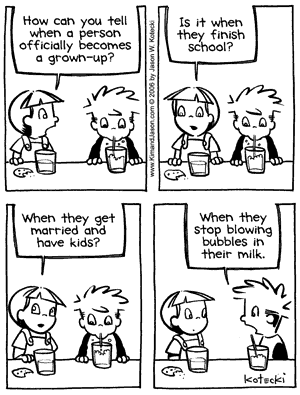My wife Kim and I had a big parenting test the other night.
At dinner, my daughter Lucy got to drink out of a “big girl cup†with a straw. And for the first time ever, she discovered how to blow bubbles in her milk.
In our household, this is on par with first words, first steps, and learning how to dunk cookies in milk.
It’s kind of a big deal.
The coolest part is that she figured it out on her own; we didn’t have to teach her. It was awesome witnessing the moment of discovery, when surprise transformed into delight. However, when her cup had become entirely consumed by bubbles, she actually grew concerned and seemed disappointed when she asked, “Where did milk go?â€
“Don’t worry, it’ll come back,†I assured her.
And it did! (One of the perks of parenting is presenting the illusion of being all-knowing.)
Naturally, blowing bubbles in her milk became much more interesting to Lucy than actually eating dinner. And Adultitis strongly encouraged both Kim and I to tell her to cut it out. The inner debate about how to proceed was more crucial than one might expect. For you see, we give out little cards to every person who attends one of our speaking programs, and it features this comic strip:
We’ve handed out thousands and thousands and thousands of these cards. Would we now become the parents who admonish our child for blowing bubbles in her milk? Kim and I exchanged a look that indicated we didn’t want to be.
I stopped the inner conversation in my head and quickly analyzed the situation: What’s the big deal? What are my main concerns? For one, I wanted to make sure she actually ate her dinner. And secondly, I was not especially keen on cleaning up after any milk bubble overflows.
So we made it clear that she needed to keep the straw (and the bubbles) in the glass. And after a few more minutes of bubble blowing fun, we pulled the glass away and told her she could resume after she ate a few more bites of her dinner. I was amazed at the responsiveness we got! Inadvertently, we had turned blowing bubbles in milk into a powerful incentive more powerful than M&Ms!
It’s easy to jump into automatic mode in our roles as parents, teachers or leaders and respond to situations in the same way we’ve seen other parents, teachers, and leaders do it, without ever stopping for just a second to question if there might be another way. That stopping is the hard part, because quite often, the other (better) way is not that hard to find.
And so I think we passed the test by honoring one of the special joys of childhood while avoiding a mess and steering clear of turing into total pushovers. (It’s nice to have some confidence going into potty training…)
Meanwhile, my little personal wish for Lucy is that she never stops blowing bubbles in her milk.
Jason Kotecki is a dad who also moonlights as an artist, author, and professional speaker. Jason and his wife Kim (a former kindergarten teacher) make it their mission in life to fight Adultitis and help people use strategies from childhood to create lives with less stress and more fun. Escape Adulthood — stop by www.KimandJason.com and follow them on Twitter @kimandjason

#
Well played!
I admire your ability to step back and take a look at the situation and how you’re reacting to it. Too often as parents, we assume that we’re right: we’re in power, and things are going to go our way, dammit!
The danger in this, of course, is that we act just like our parents, just like our teachers, or just like our bosses. We suck the fun out of life.
And what kind of life is worth living if it’s not fun?
#
Thanks Dave. It’s nice to have a few parenting victories now and then, if only to offset the many and humbling defeats 🙂 And to answer your (rhetorical) question, NO life is worth living if it’s not fun.
#
Hi, I really appreciate your blog. Great . .
Happy Friendship day sms
#
Dude, why didn’t you write a fukin interpretation to your comic ????????
best regards
Heinrich Hertz Schule